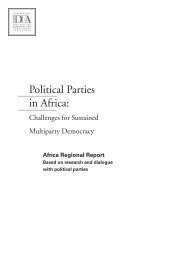Background Document - Danish Institute for Parties and Democracy
Background Document - Danish Institute for Parties and Democracy
Background Document - Danish Institute for Parties and Democracy
Create successful ePaper yourself
Turn your PDF publications into a flip-book with our unique Google optimized e-Paper software.
The program was broadly understood as aiming to promote more women in<br />
the political sphere, including encompassing political parties. Each year there are<br />
around 25 mentoring couples participating. Usually, a young woman member of the<br />
NYCS – the mentee – is associated with a woman occupying a position in politics<br />
or another high position in the public sphere (NGO, union, political party) as the<br />
mentor. The idea is <strong>for</strong> the mentee to exchange ideas <strong>and</strong> gain experience from the<br />
mentor.<br />
This mentoring program is associated with ‘additional training sessions on issues<br />
such as gender politics, media work, international politics, a visit to the Federal<br />
Office <strong>for</strong> Women’s Issues <strong>and</strong> a meeting with a female minister’. 17 The mentee/mentor<br />
is expected to fulfil a number of goals set up by the mentee, such as face-to-face<br />
meetings to talk about personal issues, <strong>and</strong> discussions on how to organise <strong>and</strong> manage<br />
the work-life balance with job, family <strong>and</strong> politics.<br />
After three years of evaluation, the results have shown that overall, the mentees<br />
reported a better career <strong>and</strong> future planning, broader networks <strong>and</strong> more self-confidence<br />
in delivering public speeches. They also mentioned being more interested<br />
in political issues in general, in political organisations such as parties <strong>and</strong> in gender<br />
equality. The program helped them improve their knowledge <strong>and</strong> practice in project<br />
management, the planning of their further education in the area of political issues<br />
<strong>and</strong> their media per<strong>for</strong>mance.<br />
It is also worth noting that this program resulted in really good media coverage<br />
in bringing the under-representation of women to the <strong>for</strong>efront of political issues.<br />
Another effect was the multiplication of the program at different levels, such as the<br />
European level in Austria, Estonia, Portugal <strong>and</strong> Malta.<br />
More has to be done by setting realistic expectations about the mentoring relationship,<br />
increasing the range of activities to increase experience, <strong>and</strong> exp<strong>and</strong>ing<br />
the time to be invested between the mentee <strong>and</strong> the mentor in order to extend positive<br />
outcomes. It is worth noting that some mentees were disillusioned about the<br />
reality of political life.<br />
THE WOMEN CAN DO IT PROGRAM IN THE BALKANS 18<br />
Originating in the Norwegian Labour Party Women’s Movement, it was then implemented<br />
in Albania, Bosnia <strong>and</strong> Herzegovina, the Kosovo province, Macedonia, Montenegro<br />
<strong>and</strong> Serbia. It aims at ‘raising awareness about gender inequality <strong>and</strong> creating<br />
the capacity to change the situation’. It is essential <strong>for</strong> women <strong>and</strong> young women<br />
who are already involved or who could potentially become active in public life. They<br />
can also be women coming from NGOs <strong>and</strong> local political parties, from the health<br />
<strong>and</strong> social sector, schools <strong>and</strong> local administration.<br />
It is sustained by a training program to increase ‘political skills <strong>and</strong> motivation<br />
among women to take on responsibilities <strong>and</strong> decision-making positions in public<br />
<strong>and</strong> political life’. It encompasses four steps: The Training-<strong>for</strong> trainers – two-day local<br />
seminars where the participants learn about gender equality status in their own<br />
countries; a training workshop to deliver speeches, cope with domineering techniques,<br />
solve problems in a creative way, manage stress <strong>and</strong> defeat, campaign <strong>and</strong><br />
network; then the participants plan a local action to practise the new skills; <strong>and</strong><br />
following that there is an evaluation seminar. Local partners (women’s group) have<br />
been the main actors within the program, carrying the main responsibility <strong>for</strong> the<br />
seminars.<br />
Overall, the evaluation of the seminars is appreciated by the participants, espe-<br />
17 Neruda, 2005, 2<br />
18 NORAD, 2005<br />
WOMEN IN POLITICS DANISH INSTITUTE FOR PARTIES AND DEMOCRACY PAGE 19
















